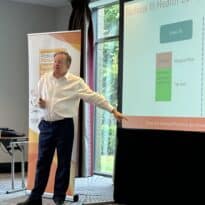Professional Paraplanner is working with mental health specialist Patrick Melville, as part of a wellbeing programme, to look at issues such as stress and anxiety within the workplace. In the second of a series of articles and webinars, Patrick looks at stress – a word accommodating a wide range of interpretations.
In association with Fidelity Adviser Solutions.
Did you know that it is Stress Awareness month in April? A full month is allocated because it is big subject. In a recent Parameters survey, Professional Paraplanner conducted a mental health survey in which we asked paraplanners about their experience and attitude to stress. The majority of respondents, 77%, said that it was ok to feel stressed but ‘only some of the time’.
It is important to understand what stress is. According to the charity MIND: “Stress is how we react when we feel under pressure or threatened.” This means that feeling under stress does not mean that we can’t manage or control a situation but it should be taken as a warning sign. Our minds often generalise our feelings, regardless of the specific issues or environments, alerting our bodies to potential danger.
And yet stress can be helpful. Did you know that there are two types of stress? The first is positive stress, called ‘Eustress’ and the second is negative stress: ‘Distress’. The term Eustress was coined by endocrinologist Hans Selye in 1975 to describe a positive cognitive response to stress. Stress can be used in a positive way but only if experienced over a short period of time. It can improve our performance by narrowing our focus and increasing our motivation on specific tasks. In a paraplanner’s working day, experiencing stress might involve juggling multiple priorities simultaneously or writing a suitability report in a short timeframe. You just need to turn to game shows or sports matches to see the positive impact of stress.
However, stress is time sensitive; contestants don’t stay on a game show for eight hours. After a period of time, our stress will reach a level that is negative.
Andrew Huberman, from Stamford University, suggests that this level is when we differentiate between two different types of stress: ‘real stress’ and the ‘mind’s translation’. The mind’s translation is the mind’s way of deciding next steps without external knowledge and which might not be real. When the mind’s translation takes over negative mental stress can be encouraged, leading to unhelpful actions, feelings and thoughts.
Once we are aware of our mind’s translation, it is important to establish the causes and find ways of managing them. If not, then our stress can lead to further stress and prevent us from sourcing the initial cause.
In November 2022, The Economist published a report entitled “Rewriting the rules: Building a healthy hybrid workplace” in which it noted the continued external influences on workplace stress: “as the pandemic fades, recession looms, giving employees and employers little respite from stress”. The result is that “workers’ daily stress levels have reached historic highs, with 44% of employees stating that they experienced stress during much of the previous day”.
Everyone has their own personal stress drivers to address. The Professional Paraplanner research identified the main drivers of stress under the headings : ‘workload’, ‘adviser(s)’, ‘team’, ‘deadlines’, ‘compliance’, ‘providers’, ‘systems’ and ‘reports’. Do any of the resonate with you?
External and trusted channels can be used to manage and release stress. This can be holding open conversations with trusted contacts and finding information available through your business or to the public. The benefits are from having a broader and real perspective. Perhaps the knowledge that you and your colleagues are not alone in feeling stressed might help alleviate your stress levels.
Something to remember is the fact that the brain can be trained. It’s called Neuroplasticity. We can train our brains to manage stress because our brains are not fixed and can adapt.
I will talk about the managing of stress and how we can train our minds in the upcoming Professional Paraplanner webinar on Monday 24 April at 12.00pm.





























